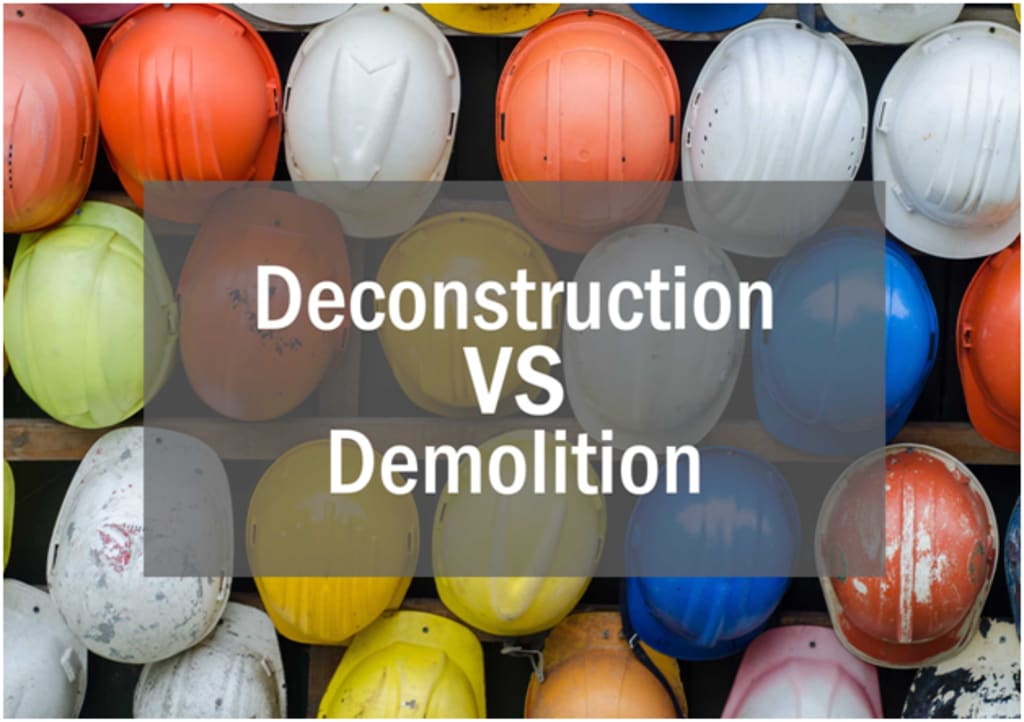
Are you weighing your options between deconstruction and demolition?
If you are, you may have already taken days contemplating which is the best for you. It’s time for you to make your decision. We understand your worry because it is a big decision and you don’t want to make a mistake.
To make it easy, you should first know your priorities and what each of these methods has to offer you.
So, here's a quick overview of the seven main differences between deconstruction and demolition. We hope understanding these distinctions will help you come to a decision.
Defining Demolition
Let us first comprehend the definition of demolition.
Demolition—This word is most commonly used in the construction industry. It involves demolishing a building so that it may be reconstructed. The foundation and all the materials will be taken out when a structure is demolished.
The method is tasked with ensuring that the structure is destroyed.
Defining Deconstruction
Often synonymously used, deconstruction is another method in the construction industry. Here, deconstruction means dismantling a building so its components may be repurposed.
It differs from demolition as not all the materials are removed from the site. Deconstruction's primary goal is to reduce the amount of garbage generated during the process.
Overview of Differences
If you are a quick reader, here are the differences we are going to cover in this post.
1. Deconstruction is a selective process, while demolition is not.
2. Deconstruction can be done by hand, while demolition cannot.
3. Deconstruction takes more time than demolition.
4. Deconstruction is less expensive than demolition.
5. Deconstruction results in less waste than demolition.
6. Deconstruction can be used for salvage, while demolition cannot.
7. Deconstruction preserves the environment, while demolition does not.
Nevertheless, stay around as we discuss each in detail.
1. Methods
Deconstruction is a selective process, while demolition is not. When you deconstruct a building, you carefully select which parts of the structure to remove and preserve.
But with demolition, the entire structure is destroyed with no regard for what can be reused or recycled. That is sorted later.
2. Scope of Manual Work
Deconstruction can be done by hand, while demolition cannot.
Because deconstruction is a more selective process, it can be done by hand without the use of heavy machinery.
Demolition, on the other hand, requires the use of bulldozers, wrecking balls, and other heavy equipment to completely level the structure.
3. Timeframe
Deconstruction takes more time than demolition. The selective nature of deconstruction means that the process takes longer than demolishing an entire structure quickly with heavy machinery.
If you choose to demolish a building, you will notice that it is generally a short operation. It is due to the fact that all you need to do is remove the foundation and all the components. Depending on the scale of the structure, the entire procedure can be finished in a matter of days.
Deconstruction, on the other hand, requires more time because each item must be removed meticulously to reuse. Though it varies based on the scale of the building, deconstruction usually takes weeks or even months.
4. Expenditure
Building deconstruction generally costs less money than demolition. It is due to the fact that you will need to dispose of all the materials, which could be expensive.
Deconstruction is somewhat less expensive since only the materials that can be reused need to be removed. As a result, you should be aware of some substantial variances in your operations.
5. Waste Generation
Deconstruction results in less waste than the demolition method does. When you deconstruct a building, much of the materials can be reused or recycled.
However, very little of the building can be salvaged with demolition, so most of it ends up in a landfill. There is also sustainable waste management in demolition, but it is a huge task compared to deconstruction.
6. Reusability
Deconstruction can be used for salvage, while demolition cannot. Because deconstruction allows you to selectively remove parts of the building, you can salvage items like windows, doors, and plumbing fixtures to be reused in other projects. With demolition, everything is destroyed so that nothing can be reused.
7. Eco-friendliness
Deconstruction preserves the environment, while it is difficult with demolition. It’s not impossible, but difficult.
The ability to reuse and recycle materials from a deconstructed building helps preserve natural resources. Demolition, on the other hand, creates waste that strains our landfills and negatively impacts the environment.
Conclusion:
When deciding whether to deconstruct or demolish a building, there are several factors to consider, including cost, time, waste, and reusability.
In general, deconstruction is a more environmentally-friendly option that allows you to reuse or recycle some of the materials from the original structure.
However, you cannot avoid the need for demolition in certain cases. If that is your case, you must remember to take more care than usual. One way is to research well and choose a Trusted House Demolition service in Melbourne.
Once a reliable demolition company takes up your project, everything will be smoother than you think. A good recommendation is Merhi Group. Check out their demolition services, and you will understand their expertise and efficiency.
About the Creator
Arick Dm
Working in Make My Website a digital agency made up of extremely talented, highly trained and skilled professionals who work with you to create your online presence.






Comments
There are no comments for this story
Be the first to respond and start the conversation.